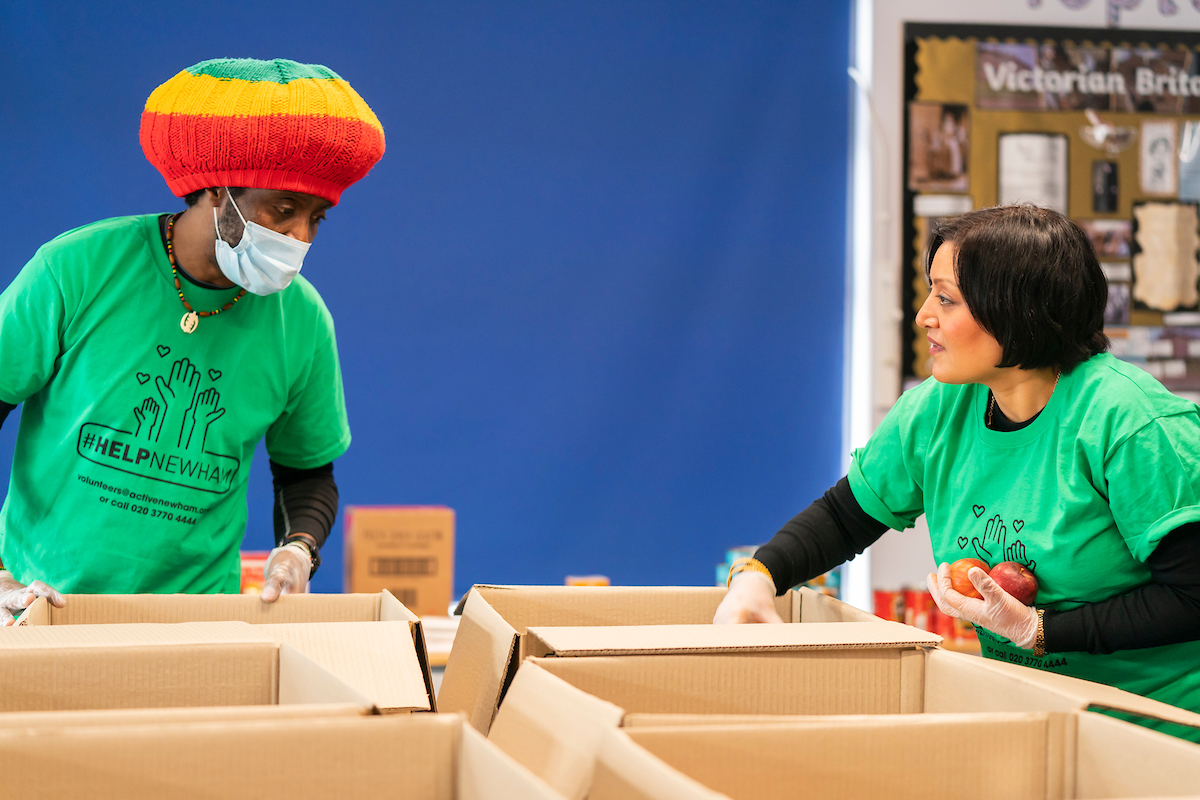
Newham Council has delivered over 17,000 food packages and other essential household items to older or vulnerable residents with the help of redeployed Council staff and volunteers from the community.
Within a few days, the Council set up seven #HelpNewham hubs across the borough as central distribution locations from which food and other essential supplies could be packaged for residents most in need. The eighth hub was set up in early May.
The food packages have been put together and designed by Newham’s food strategy team and nutrition experts, to keep residents healthy and fit to beat the virus. With over 3,500 packages going out this week alone, the box contains fresh vegetables, fruit and for Ramadan, there will be hundreds of kilos of dates distributed to people breaking their fast. There have also been over 950 family boxes issued out for families in need.
The council has spoken to over 21,705 vulnerable residents to see how they are coping in the current situation and to make sure that people have adequate supplies of food and other essential supplies. In addition, family packs are available providing essential items such as nappies and sanitary products.
The #HelpNewham offer has also seen, over 5000 prescriptions delivered to residents, with the council working with 38 pharmacies in the borough to help residents get their medicines.
Residents are also offered the opportunity to talk to a council staff member who has been redeployed and trained to chat and provide support to residents on the phone as part of #HelpNewham’s befriending offer. Thousands of calls have been made to residents who do not have any other support systems and have indicated they would like to have a friendly chat.
Beyond the Help Newham Hubs, the council has worked with voluntary and community groups to get over 62 tonnes of surplus food out to the borough as part of Newham’s work with the London Food Alliance.
The hubs were created in record time because the Council’s research suggested that a third of the borough’s residents have no-one they can turn to in a crisis. They are staffed by an army of volunteers as well as redeployed Council staff.
The council has also supported 20 voluntary and community organisations to accept fresh, frozen and chilled foods, as well as the more traditional dried and canned goods associated with food surplus distribution. This has amounted to over 62 tonnes of surplus food and has been achieved by training and supporting staff and the purchase of large commercial fridges and freezers, so that organisations can store the fresh produce.
The distribution of the food is every day, with a fleet of redeployed vehicles, which bring around 3 tonnes of surplus food provided by the London Food Alliance, into the borough and 10 redeployed highways vehicles, re-configured school buses and a dozen smaller vehicles supporting the hubs, the voluntary and community sector and other vulnerable groups who need food.
Rachel Ledwith, who runs FareShare London – which is a partner in the London Food Alliance and where food volumes have increased fourfold since the outbreak - praised Newham council’s approach to the pandemic. She said: “Newham council have set a leading example in how to turn surplus food that would otherwise go to waste, into a sustainable supply of food to people who need it. By investing in fridges and freezers and supporting the voluntary and community partners, the council has been focused on getting large volumes of surplus food into the borough. That work will leave a legacy beyond this crisis in tackling food poverty across Newham.”
Mayor Rokhsana Fiaz joined volunteers preparing the packages at one of the hubs, Curwen Primary School in Plaistow. She said: “The hubs are working with our schools, faith groups, youth workers, residents and local businesses, who have all made incredibly generous donations. In our last survey of residents, nearly a third of people said that they had no-one they could rely on when things became difficult. It’s a stark reminder that even in one of the busiest cities in the world, people can feel incredibly lonely and isolated. I have been incredibly moved and impressed by the work people are putting in to support those at risk.”
